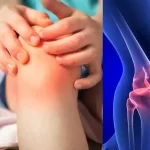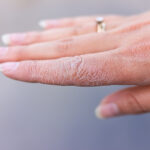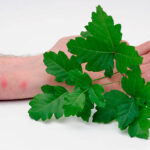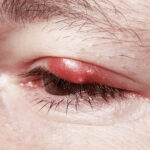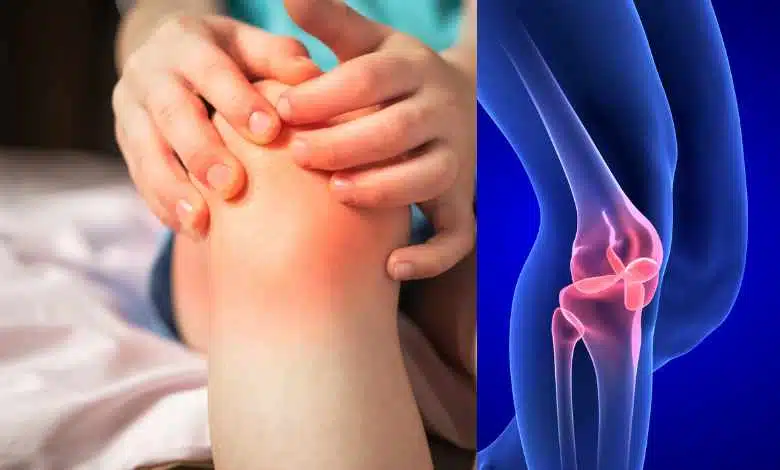Helpful Home Remedies for Scalp Psoriasis
Becoming a vegetarian is one of the possible home remedies for scalp psoriasis. This ailment is may be linked to faulty fat utilisation while attack are related to times of stress, surgery, illness, cuts, certain viral and bacterial infections.
Imagine your scalp as a bustling city with millions of tiny residents living harmoniously.
However, sometimes these residents get a little too excited and start causing trouble. That’s what happens when you have scalp psoriasis.
In simple terms, scalp psoriasis is like a revolt happening on your scalp. The skin cells on your scalp start growing much faster than they should, leading to a buildup of thick, scaly patches.
These patches can be itchy, flaky, and sometimes even painful. It’s as if your scalp’s “traffic control system” is malfunctioning, and the cells are going haywire.
Just like in a revolt, the immune system is involved too. It mistakenly sees these extra skin cells as threats and sends out its troops to fight them. This causes inflammation and further aggravates the situation.
Living with scalp psoriasis can be frustrating. It’s like having a constant reminder that your scalp is rebelling against you.
The symptoms can be bothersome, affecting your appearance and causing discomfort. But don’t worry, just like any other rebel group, scalp psoriasis can be managed with the right approach and treatment.
By understanding the triggers that set off the revolt, such as stress, certain medications, or even weather changes, you can take steps to keep things under control.
Gentle care for your scalp, using moisturizing shampoos and avoiding harsh chemicals, can also help soothe the rebellion.
Sometimes, you may need reinforcements in the form of medicated treatments. These can come in the form of creams, gels, or special shampoos designed to calm the revolt and bring peace back to your scalp.
It may take some trial and error to find the right strategy for you, but with patience and persistence, you can find relief.
Remember, scalp psoriasis is not contagious, so you don’t have to worry about spreading it to others. It’s just your scalp’s way of expressing its discontent.
With a little understanding, care, and the right treatment, you can help your scalp return to its peaceful and harmonious state once again.
Symptoms of Scalp Psoriasis
It appears like a patches of silver scales or red areas and is found in the scalp, arms, knees, legs, elbow, ears and back.
Scalp psoriasis is a chronic autoimmune skin condition that affects the scalp. Its symptoms can vary from person to person, but some common signs and symptoms of scalp psoriasis include:
- Red patches: Raised, inflamed, and red patches of skin on the scalp.
- Silver or white scales: Thick, silvery or white scales that cover the red patches of skin.
- Itching: Persistent itching and discomfort on the scalp.
- Dryness: Dry and cracked skin on the scalp.
- Flaking: Flaking of the scalp, similar to dandruff.
- Scalp tenderness: The affected areas may feel sore or tender.
- Bleeding: In severe cases, scratching or picking at the scales can lead to bleeding.
- Hair loss: Temporary hair loss may occur in the affected areas, although the hair usually grows back once the condition improves.
It’s important to note that scalp psoriasis can coexist with other types of psoriasis, such as plaque psoriasis, which can affect other parts of the body as well.
If you suspect you have scalp psoriasis or any other skin condition, it’s best to consult a healthcare professional for a proper diagnosis and treatment
Causes of Scalp Psoriasis
The drugs such as chloroquine, lithium, and beta-blockers cause this ailment to flare up.
It may be a hereditary factor and previous immunisations may be a causative factor for some individuals.
While the exact cause is not fully understood, the following are known factors that can contribute to the development or exacerbation of scalp psoriasis:
- Genetic Predisposition: A family history of psoriasis increases the likelihood of developing scalp psoriasis. Certain genes related to the immune system and skin cell growth are believed to play a role.
- Immune System Dysfunction: Scalp psoriasis is an immune-mediated condition, where the immune system mistakenly attacks healthy skin cells, triggering an inflammatory response. The exact reasons behind this immune dysfunction are still being studied.
- Environmental Triggers: Certain environmental factors can act as triggers for scalp psoriasis flare-ups. These may include stress, infections (such as strep throat), injury to the scalp, cold and dry weather, and exposure to harsh chemicals or irritants.
- Hormonal Changes: Fluctuations in hormone levels, particularly during puberty, pregnancy, or menopause, can influence the onset or severity of scalp psoriasis. Hormonal changes can affect the immune system and inflammatory responses.
- Medications: Some medications, such as lithium (used to treat bipolar disorder), antimalarial drugs, and certain beta-blockers, have been associated with triggering or worsening psoriasis symptoms, including scalp involvement.
- Lifestyle Factors: Unhealthy lifestyle choices, such as smoking, excessive alcohol consumption, and obesity, can contribute to the development and progression of psoriasis, including scalp psoriasis.
- Psychological Factors: Emotional stress and psychological factors, such as anxiety and depression, are known to have a correlation with psoriasis. While they may not directly cause scalp psoriasis, they can exacerbate symptoms or trigger flare-ups.
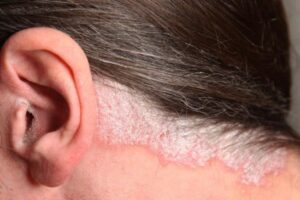
It’s important to note that scalp psoriasis is a chronic condition that can vary in severity over time. Identifying and managing these potential triggers, along with appropriate medical treatment, can help individuals with scalp psoriasis effectively control their symptoms and improve their quality of life.
Consulting with a healthcare professional or dermatologist is recommended for accurate diagnosis and personalized treatment plans.
Typical Home Remedies for Scalp Psoriasis
An increased intake of animal protein is able to cause it spread outward. However, a reduction tends to shrink it and this is the reason why I stated earlier that becoming a vegetarian is of the home remedies for scalp psoriasis.
- Since psoriasis is a metabolic disease, a cleansing juice fast, 2 to 3 times for the first week, is a good way to start towards its recession. Four weeks later, the fast can be carried out again.
- In order to carry out the necessary work regarding home remedies for scalp psoriasis, it is necessary to discard all junk food. Again, all allergy foods should be searched and eliminated.
- Beware of milk and wheat and it’s advisable to exclude then for about 6 months.
- Eat a diet of 50% raw food, with plenty of fruits and vegetables. Eat whole grains, nuts and legumes.
- Avoid fats (butter, milk, eggs, meat, cream), processed food, white flour, sugar and citrus fruit.
- Remember that milk, cheese, eggs, meat and poultry contain arachidonic acid, which causes psoriatic lesions to turn red and swell.
- Primrose oil (1 capsule 3 times daily) helps counteract arachidonic acid.
- Get your food oils from natural foods, such as flaxseed, soybeans and sesame.
- Flaxseed oil contains a chemical which tends to reduce psoriasis. Take 3 to 4 Tbsp. Lecithin granules each day for 2 months. Then reduce dosage by one-half.
- Vitamins A, B complex, C, and D all help the skin and appear to be of help in reducing psoriasis.
- Lose weight is you are overweight, because weight loss helps reduce psoriasis.
- Avoid heavy stress which is capable of making it worse. Try to retain a calm, cheerful outlook on life. Existing psoriasis tend to get worse when you come down with some other infection.
- Swimming in the ocean is good to reducing psoriasis and bathing in heated baths is quite quit helpful.
- Apply vitamin D3 cream for good results.
- A combination of milk thistle seed, dandelion root, oregon grape root, yellow dock and garlic (combined in a tea) eliminates psoriasis within 1 to 3 months.
- Angelica contains psoralens, which fight psoriasis. Make a tea and drink it. Foods plants containing psoralens include carrots, celery, figs, fennel and parsnips.
While there is no cure for scalp psoriasis, there are several home remedies that can help manage the symptoms and provide relief.
Here are some commonly suggested home remedies for scalp psoriasis
Regular scalp hygiene: Gently washing your scalp with a mild shampoo can help remove scales and reduce itchiness. Avoid using harsh shampoos or excessive scrubbing, as it can worsen the condition.
Moisturize: Applying a moisturizer or emollient to the scalp can help alleviate dryness and reduce scaling. Look for products specifically designed for psoriasis or choose natural moisturizers like coconut oil or aloe vera gel.
Tar-based products: Tar-based shampoos or ointments containing coal tar or pine tar can help reduce inflammation and itching. Follow the instructions provided and be cautious of potential staining.
Salicylic acid: Shampoos or solutions containing salicylic acid can help soften and remove scales. It’s important to use these products as directed and avoid excessive use, as they can cause skin irritation.
Topical corticosteroids: Over-the-counter or prescription corticosteroid creams, ointments, or gels can help reduce inflammation and itching. Use them according to the instructions provided and consult a healthcare professional for appropriate usage.
Natural remedies: Some people find relief using natural remedies such as aloe vera gel, apple cider vinegar rinses, tea tree oil, or oatmeal baths. It’s advisable to test these remedies on a small patch of skin first to ensure you don’t have any adverse reactions.
Avoid triggers: Identify and avoid triggers that worsen your scalp psoriasis. Common triggers can include stress, certain foods, alcohol, smoking, and harsh hair products.
Sun exposure: Moderate exposure to sunlight can help improve scalp psoriasis symptoms for some individuals.
However, it’s crucial to protect your skin from excessive sun exposure and use sunscreen on areas not affected by psoriasis.
Remember, these home remedies may provide relief for some individuals, but their effectiveness can vary.
It’s important to consult with a healthcare professional for an accurate diagnosis and to discuss appropriate treatment options for your specific condition.
Foods to avoid with Kidney Failure
How To Take Care of Your Kidney

A graduate of Computer Science and Information Management Technology. Diploma – Caregiving, Certificates – Dementia and Diabetes Awareness and Management. A researcher, blogger, songwriter, singer and acoustic guitarist. Born in an environment where natural talents such as healing are imparted at our natural birth. This natural talents of healing is the result of our genetic inheritance and the training from family environment.

